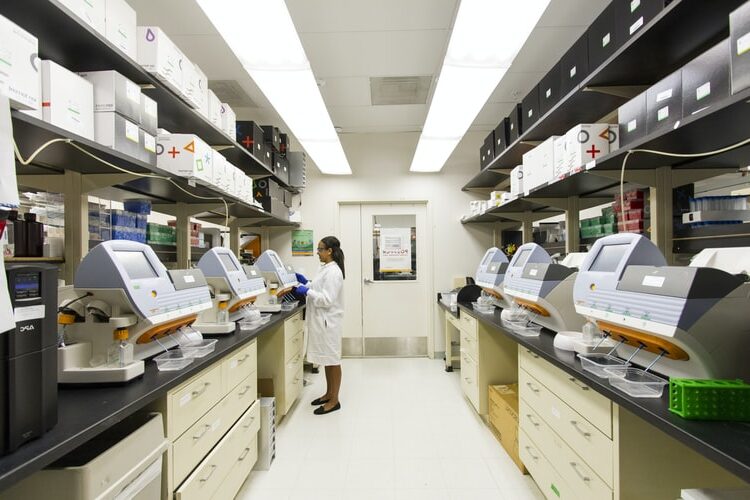UK Life Sciences Vision sets 10-year strategy for sector to solve some of the biggest healthcare problems of our generation, including cancer and dementia.
- UK Life Sciences Vision sets 10-year strategy for sector to build on successes of COVID-19 response and accelerate delivery of innovations to patients
- mission-led approach to solve some of the biggest healthcare problems of our generation, including cancer and dementia
- launch of Life Sciences Investment Programme brings total amount of funding available to UK’s most promising life sciences companies to £1 billion
The remarkable response of the UK’s world class life sciences sector to COVID-19 will be used as a blueprint to accelerate the delivery of life-changing innovations to patients, as part of the government’s new UK Life Sciences Vision published today (Wednesday 7 July).
Today’s new UK Life Sciences Vision co-developed with businesses and experts in the field, sets out a mission-led approach with bold ambition for the next decade to ensure scientific excellence, partnered with the dynamism of industry, is replicated to assist the NHS in solving the most pressing health challenges of our generation now and in the future.
The Vision outlines 7 critical healthcare missions that government, industry, the NHS, academia and medical research charities will work together on at speed to solve – from cancer treatment to tackling dementia.
These missions will focus on preventing, diagnosing, monitoring and treating disease early, using innovative clinical trials to develop breakthrough products and treatments quickly to help save lives, and accelerating the development and adoption of new drugs, diagnostics, medical technology and digital tools.
The missions are:
- Accelerating the pace of studies into novel dementia treatment
- Enabling early diagnosis and treatments, including immune therapies such as cancer vaccines
- Sustaining the UK’s position in vaccine discovery, development and manufacturing
- Treatment and prevention of cardiovascular diseases and its major risk factors, including obesity
- Reducing mortality and morbidity from respiratory disease in the UK and globally
- Addressing the underlying biology of ageing
- Increasing the understanding of mental health conditions, including work to redefine diseases and develop tools to address them
The Vision looks to emulate the successes of the UK Vaccines Taskforce – harnessing private sector expertise and removing unnecessary bureaucracy so that the UK’s most knowledgeable industry leaders can tackle future healthcare challenges at speed and at risk – with the aim of changing people’s lives for the better.
It will ensure that the UK benefits from new regulatory freedoms and opportunities now that we have left the European Union. The Medicines & Healthcare products Regulatory Agency (MHRA) will be able to act as an independent, sovereign regulator with great agility and with a focus on getting vaccines, drugs, and technologies to patients as safely and quickly as possible.
Addressing the most pressing healthcare challenges of our generation now and in the future will be an important part of the government’s levelling up agenda, helping to reduce health inequalities and improving out comes for patients in every corner of the UK.
Addressing the healthcare challenges we face today requires a life sciences strategy of bold ideas backed by evidence and data. The Vision we are setting out provides a new blueprint for how government, the NHS and industry can work together to deliver the next generation of therapies, diagnostics and insights to improve patient health, to create a truly outstanding environment for healthcare companies to invest and grow, and to reinforce the UK’s position as a leading global destination for medical scientific research and investment.
Central to the Life Sciences Vision is a focus on cultivating a business environment in which UK life sciences firms can access finance to innovate and grow, are regulated in an agile and efficient way, and are incentivised to onshore manufacture and commercialise their products in the UK.
To support this ambition, the government has today also launched its Life Sciences Investment Programme, a £200 million government investment that will unlock the potential of innovative UK life sciences companies so that they can grow their operations and create high-skilled jobs in the UK.
The programme will leverage further private sector investment and support the development of a world leading UK life sciences venture capital ecosystem. The investment will be delivered through British Patient Capital, part of the government-owned British Business Bank, which will allocate the £200 million to specialist funds.
In a further boost to the sector, British Patient Capital has recently agreed a collaboration with Abu Dhabi’s Mubadala Investment Company, one of the world’s leading sovereign investors. Under this partnership, facilitated by the Office for Investment, Mubadala has committed to invest £800 million in the UK life sciences industry and will work with British Patient Capital to identify sector trends and investment opportunities.
In total, this means £1 billion of new funding is available for the UK’s most promising life sciences companies, with the potential to crowd in further funding from other investors.
The Life Sciences Investment Programme will have access to a scientific advisory panel composed of leading industry figures, chaired by Life Sciences Champion Professor Sir John Bell. The panel will share insight on key scientific trends.
The life sciences sector is critical to the UK’s health, wealth and resilience, employing more than 250,000 people and generating an £80 billion turnover each year in the UK. A key theme of the Vision is to support the sector to grow, attracting investment and creating high skilled jobs across the UK.


